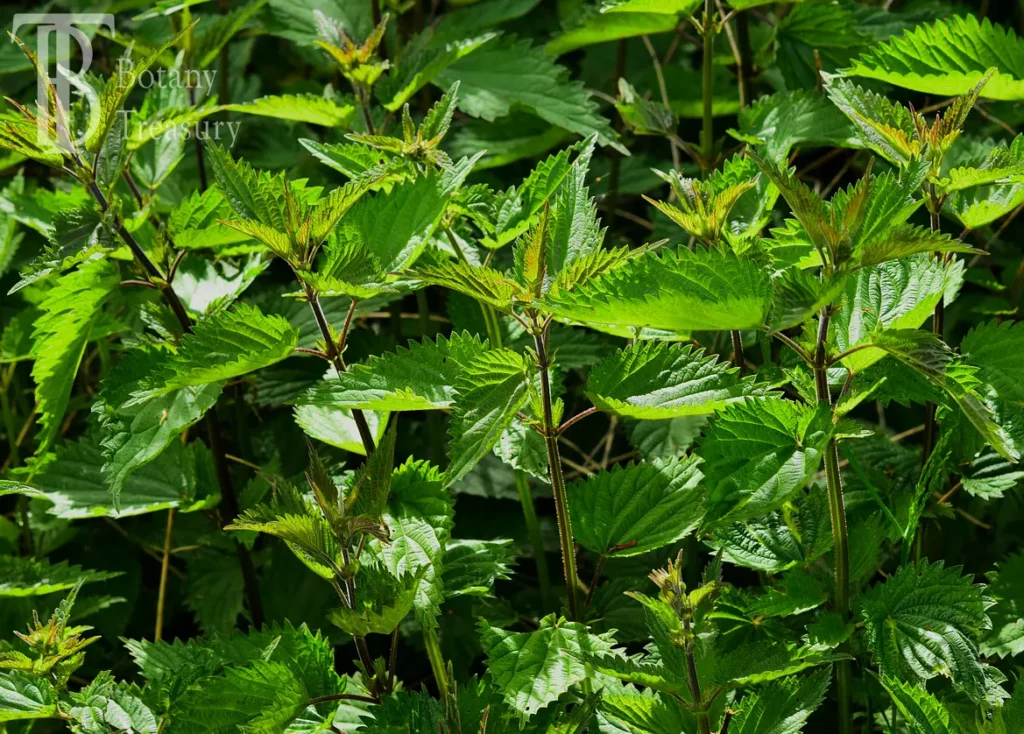
Nettle
Nettle, scientifically known as Urtica dioica, is a herbaceous perennial flowering plant that is widely distributed across temperate regions. It is known for its stinging hairs, which contain histamine and other chemicals that cause irritation and inflammation when touched. Despite its prickly nature, nettle has been used extensively in various contexts, including medicine, and textiles. Nettle also can be used as a compost activator, providing nitrogen, magnesium, sulphur, and iron.
The active ingredients of nettle include:
- Phenolic Compounds: These include flavonoids, phenolic acids, and other polyphenolic compounds that contribute to the plant’s antioxidant and anti-inflammatory properties.
- Terpenes: These plant chemicals are involved in the plant’s defense mechanisms and have been found to have antimicrobial and antifungal effects.
- Vitamins: Nettle is a rich source of vitamins A, C, and K, as well as other B vitamins, which contribute to its nutritional value and potential health benefits.
- Minerals: Nettle contains minerals like calcium, iron, magnesium, potassium, and silicon, which are essential for maintaining overall health and preventing various diseases.
- Carotenoids: The plant contains various carotenoids, including lutein, zeaxanthin, and beta-carotene, which are responsible for its yellow color and have antioxidant properties.
- Fatty Acids: Nettle contains omega-3 fatty acids, particularly alpha-linolenic acid, which is beneficial for heart health and may help reduce inflammation.
- Antioxidants: Nettle is rich in antioxidants, including flavonoids, phenolic acids, and carotenoids, which help protect the body against oxidative stress and damage caused by free radicals.
These active ingredients contribute to the diverse health benefits associated with consuming nettle, including antioxidant, anti-inflammatory, and antimicrobial effects, as well as potential benefits for cardiovascular health, immune function, and eye health.
Medicinal Uses
- Nettle is a valuable herb with numerous health benefits. It can be used to treat various conditions, such as:
- Pregnancy and Breastfeeding: Nettle is a fantastic iron tonic during pregnancy and can help stimulate breast milk production after birth.
- Menopause: The high calcium content in nettle helps prevent osteoporosis during menopause.
- Hair, Skin, and Nails: Nettle promotes healthy hair, skin, and nails when taken internally.
- Burns and Inflammation: A poultice of nettle leaf can soothe burns and reduce inflammation.
- Arthritis and Joint Problems: Raw nettle application can improve blood flow and circulation, relieving arthritis and joint issues.
- Benign Prostatic Hypertrophy: Nettle root can help alleviate symptoms of benign prostatic hypertrophy in men.
- Kidney Issues: Nettle seeds have been used to heal kidney problems and even help some individuals stop needing dialysis. However, more research is needed to confirm these potential benefits.
Textiles and Fibre:
Nettle stems contain a bast fibre that has been used for centuries to make clothing, ropes, and paper. The fibre is coarser than linen but can be used for similar purposes. Nettle was used extensively during World War I to make German army uniforms due to a cotton shortage.
Botany Treasury offers high-quality nettle sourced from sustainable farms. To inquire about purchasing nettle or other botanical ingredients, please contact us.
